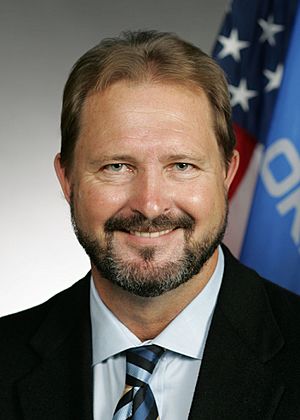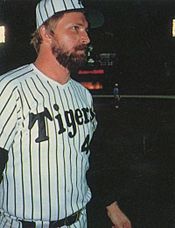Randy Bass facts for kids
Quick facts for kids
Randy Bass
|
|||
|---|---|---|---|
 |
|||
| Minority Leader of the Oklahoma Senate | |||
| In office January 6, 2015 – July 3, 2015 |
|||
| Preceded by | Sean Burrage | ||
| Succeeded by | John Sparks | ||
| Member of the Oklahoma Senate from the 32nd district |
|||
| In office January 4, 2005 – January 3, 2019 |
|||
| Preceded by | Jim Maddox | ||
| Succeeded by | John Montgomery | ||
| Personal details | |||
| Born | March 13, 1954 Lawton, Oklahoma, U.S. |
||
| Political party | Democratic | ||
| Spouses |
Linda Bass
(m. 1976, divorced)Kelley Bass
(m. 2002) |
||
| Children | 3 | ||
|
Baseball career |
|||
| First baseman | |||
|
|||
| debut | |||
| September 3, 1977, for the Minnesota Twins | |||
| Last appearance | |||
| June 7, 1982, for the Texas Rangers | |||
| MLB statistics | |||
| Batting average | .212 | ||
| Home runs | 9 | ||
| Runs batted in | 42 | ||
| NPB statistics | |||
| Batting average | .337 | ||
| Home runs | 202 | ||
| Runs batted in | 486 | ||
| Teams | |||
|
|||
| Career highlights and awards | |||
|
|||
| Induction | 2023 | ||
| Vote | 78.6% | ||
| Election Method | Experts Division | ||
Randy William Bass (born March 13, 1954) is an American politician and a former professional baseball player. He played in both Major League Baseball (MLB) in the United States and Nippon Professional Baseball (NPB) in Japan. After his baseball career, he served as a state senator in Oklahoma.
Bass started his MLB career in 1977, playing for five different teams over six seasons. In 1983, he moved to Japan and joined the Hanshin Tigers. He helped lead the Tigers to a Japan Series championship in 1985. Bass won the batting Triple Crown twice in Japan. He still holds the record for the highest single-season batting average in Japanese baseball history. Many consider him one of the best American players ever in Japanese baseball. He was inducted into the Japanese Baseball Hall of Fame in 2023.
From 2005 to 2019, Bass represented the 32nd district in the Oklahoma Senate. He was a member of the Democratic Party.
Contents
Randy Bass's Baseball Career
Playing in American Baseball
Randy Bass went to Lawton High School. He was an all-state player in both baseball and football. He even received scholarship offers to play college football.
The Minnesota Twins chose Bass in the seventh round of the 1972 MLB draft. He decided to sign with the Twins instead of going to college. Bass made his MLB debut as a first baseman in 1977. He played for several teams, including the Kansas City Royals, Montreal Expos, San Diego Padres, and Texas Rangers.
In his six seasons in Major League Baseball, Bass was often a pinch hitter. This means he would come off the bench to bat instead of starting the game. He played in 130 games. He had a .212 batting average, hit nine home runs, and had 42 runs batted in (RBIs).
Playing in Japanese Baseball
After his contract ended in 1982, Bass signed with the Hanshin Tigers in Japan. He became their starting first baseman. Many people believe Bass single-handedly helped the Tigers become a much better team. This led to them winning the league championship and the Japan Series title in 1985.
Bass quickly adjusted to playing in Japan. He hit 35 home runs in his first season in 1983. He became a star player for the Tigers for several years. He won the league batting title four times in a row. In 1986, he almost became the first player in Japan to bat .400. He finished the season with a .389 average, which is still a record today. Bass also won the batting Triple Crown in both 1985 and 1986. A Triple Crown means a player leads the league in batting average, home runs, and RBIs in the same season.
In 1985, Bass came very close to breaking the record of 55 home runs in a single season, held by Sadaharu Oh. Bass finished the year with 54 home runs. In the very last game of the season, the opposing team's pitcher intentionally walked Bass every time he came to bat. This prevented him from having a chance to tie or break the record.
Bass left the Tigers in November 1988. He had returned to the United States because his son, Zach, was diagnosed with brain cancer. There were disagreements with the team about his return and about paying for his son's medical expenses. Bass later filed a wrongful termination lawsuit against the Tigers.
In 2023, Randy Bass was inducted into the Japanese Baseball Hall of Fame. He was chosen by the experts division, receiving 78.6% of the votes.
The Curse of the Colonel
Randy Bass is also famous in Japan because of something called the "Curse of the Colonel". After the Hanshin Tigers won the Central League Pennant in 1985, fans celebrated in a wild way. They called out the names of team members, and for each name, a fan who looked like that player would jump into the Dōtonbori canal. When it was Bass's turn, someone threw a life-sized statue of Colonel Sanders (the mascot of Kentucky Fried Chicken) into the river. The statue was lost.
Some people believe that losing the statue caused the team to have many bad seasons afterward. The Tigers did not win another Japan Series title until 2023. Bass was named the Japan Series MVP in 1985.
How Randy Bass's Name is Said in Japanese
In Japanese, Randy Bass's last name is usually written as "Bāsu" (バース). This is a little different from the usual way "Bass" would be written. The Hanshin Tigers team asked for this change. This was because the company that owned the team also owned a bus line called Hanshin Bus. They worried that if Bass's name was written the usual way, newspapers might make headlines like "Hanshin Bus unstoppable" or "Hanshin Bus crashes." This could make their bus company look bad.
Randy Bass's Political Career
After retiring from baseball in 1988, Bass became involved in community projects. He helped promote baseball in his home state of Oklahoma. He also continued to visit Japan as a cultural ambassador.
In 2004, Randy Bass was elected to the Oklahoma Senate as a Democrat. He was re-elected in 2006, 2010, and 2014. In 2010 and 2014, he ran without anyone opposing him. In the Senate, he worked on committees related to money, retirement, insurance, and law.
On April 10, 2014, Bass was chosen as the minority leader for the Democrats in the Oklahoma Senate. This meant he was the main leader for his party in the Senate. He held this position until July 2015. Bass could not run for re-election in 2018 because of term limits, which set a maximum number of terms a politician can serve.
Randy Bass's Personal Life
Randy Bass has been married two times. He has two children with his first wife, Linda. He has one child with his second wife, Kelley.
Honours
 | Jessica Watkins |
 | Robert Henry Lawrence Jr. |
 | Mae Jemison |
 | Sian Proctor |
 | Guion Bluford |


